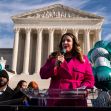The Supreme Court has agreed to take on a case that would challenge whether or not a Colorado Law violates a business owner’s religious freedoms.
The case centers around Colorado web and graphic designer, Lori Smith. Smith owns a web design company, 303 Creative LLC. In seeking to expand her business, Smith wanted to begin offering services in which she designs wedding websites for couples. As part of her company’s expansion, Smith created a webpage in which she explains why she cannot offer her web services to same-sex couples. The web designer explained that doing so would be a violation of her religious freedoms and Christian faith. Despite her beliefs, Smith explains that she cannot publish her web page because doing so would be a violation of Colorado’s Anti-Discrimination Act. Under this law, businesses cannot publish media that communicate the denial of services based on an individual’s sexual orientation.
After having her case thrown out of district court, Smith appealed the decision. However, her appeal was also rejected. Following the federal appeals ruling against her, Smiths' lawyers detailed that the court’s decision amounts to the "extreme position that the government may compel an artist -- any artist -- to create expressive content, even if that content" goes against the artist’s beliefs.
Prior to the case being taken up by the Supreme Court, the state's Democratic Attorney General, Phil Weiser, tried to dissuade the justices from hearing it. Weiser explained that there was no “credible threat” of the law being enforced because “the company has never offered wedding website services to any customer."
This case conjures up similar sentiments to those in the 2017 case of a Colorado baker who refused to create a cake for a same-sex couple. The baker, Jack Phillips of Masterpiece Cakeshop, maintained that it was a violation of his rights to create a work of art for the same-sex couple because the artistic creation went directly against his Christian faith.
In the case of Masterpiece Cakeshop v. Colorado Civil Rights Commission, the high court did not focus on the broader issues of infringement on an individual's religious beliefs, freedom of speech, and the state’s anti-discrimination law. Rather, the high court issued a narrow ruling which focused on the details of Phillips’ case specifically.
The 7-2 ruling which was handed down in 2018 was in favor of Phillips. Justice Anthony Kennedy, who wrote for the court, detailed that as the artist, Phillips was entitled to religious liberties. Kennedy shared, "The outcome of cases like this in other circumstances must await further elaboration in the courts, all in the context of recognizing that these disputes must be resolved with tolerance, without undue disrespect to sincere religious beliefs, and without subjecting gay persons to indignities when they seek goods and services in an open market."
The Supreme Court has since shifted around following the ruling in Masterpiece Cakeshop v. Colorado Civil Rights Commission. Phillips’ case was heard in the high court’s 2017-2018 term, the last term Justice Kennedy served in. Justice Brett Kavanaugh later replaced him in 2018. In 2020, the court was pushed further to the right after conservative Justice Amy Coney Barrett joined the bench following the death of Democratic Justice Ruth Bader Ginsberg, or RBG as the world of pop culture later came to call her.
After announcing they would be hearing the case, the Supreme Court shared in an order that they wish to only consider the first question, namely “[w]hether applying a public-accommodation law to compel an artist to speak or stay silent violates the Free Speech Clause of the First Amendment.”






